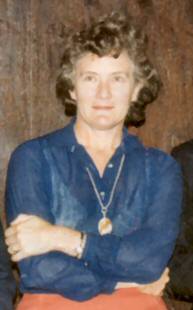Ruth Frances Bishop AC (12 May 1933 – 12 May 2022)[3][4] was an Australian virologist, who was a leading member of the team that discovered the human rotavirus.
Ruth Bishop | |
|---|---|
 Bishop c. 1980 | |
| Born | Ruth Frances Langford 12 May 1933 Dandenong, Victoria, Australia |
| Died | 12 May 2022 (aged 89)[2] |
| Alma mater | University of Melbourne |
| Known for | Discovery of human rotavirus |
| Awards | Officer of the Order of Australia (1996) Prince Mahidol Award (2011) Florey Medal (2013) Companion of the Order of Australia (2019) |
| Scientific career | |
| Fields | Virology |
| Institutions | Royal Children's Hospital World Health Organization University of Melbourne[1] |
Biography
editBishop was born in Dandenong, Victoria,[4] and grew up in Frankston where her father was principal of Frankston High School.[5]
Bishop obtained a B. Sc., majoring in microbiology, in 1954 followed by a M. Sc. in the same field in 1958 and graduated with a PhD in microbiology in 1961.[6][7]
In 1973, Bishop, along with Geoffrey Davidson (Royal Children's Hospital) and collaborators Ian Holmes and Brian Ruck (University of Melbourne), examined cells from the intestines of children with gastroenteritis.[8] Intestinal biopsies were taken at the Royal Children's Hospital in Melbourne, Australia, and sent to Ian Holmes and Brian Ruck (University of Melbourne) to be examined by electron-microscopy.[9]
Under the electron microscope cells were seen to be infected with viruses, which were originally named "duovirus" because they were seen in the duodenum and had a double capsid. The name "rotavirus" was later suggested by the Irishman, Thomas Henry Flewett, because of the round, wheel-like shape of virus particles. Rotaviruses cause diarrhoea and vomiting in young children and are a leading cause of death in the developing countries. Three thousand children are now hospitalised with rotavirus every year, down from 10,000 before the vaccine was introduced in 2007. Bishop said the invention of electron microscopy helped her make the discovery. The team's discovery led to a global effort to control of rotavirus.[10][11]
Bishop also published theoretical works about the patterns in the epidemiology of rotavirus infection.[12]
From 1983 to 1988, Bishop was Chair of the Committee on Diarrhoeal Diseases with the World Health Organization (WHO).[4]
Awards and honours
editBishop was made an Officer of the Order of Australia (AO) in the 1996 Queen's Birthday Honours in recognition of service to medical research, particularly for her contributions to the understanding of gastroenteritis in children.[13] In the 2019 Queen's Birthday Honours she was promoted to Companion of the Order of Australia (AC) for "eminent service to global child health through the development of improved vaccines for paediatric gastroenteritis, and to medical research".[14]
In 2001, she was inducted to the Victorian Honour Roll of Women. In 2011, she received the Prince Mahidol Award awarded by the Thai Royal Family for outstanding achievement in public health.[4]
Bishop was awarded the Florey Medal in 2013 for her discovery of rotavirus and subsequent work helping to develop a vaccine. The medal recognises significant achievements in biomedical research.[5][15] This was the first time a woman was honoured with this award.[16]
In 2020, the Melbourne based Bio21 building announced Ruth Bishop as the namesake of their new imaging building, the "Ruth Bishop Building", housing the University of Melbourne's Ian Holmes Imaging Centre.[17][7]
References
edit- ^ Lai-Wong, Christa (23 May 2022). "Vale Professor Ruth Frances Bishop AC BSc MSc PhD DSc". Melbourne Medical School. The University of Melbourne. Retrieved 4 July 2022.
- ^ "Vale Professor Ruth Bishop AC BSc MSc PhD DSc - Murdoch Children's Research Institute". www.mcri.edu.au. Institute News. Retrieved 4 July 2022.
- ^ Murdoch Children's Research Institute
- ^ a b c d Who's Who in Australia, ConnectWeb, 2013.
- ^ a b Precel, Nicole (30 October 2013). "Professor Ruth Bishop wins 2013 CSL Florey Medal". Frankston Standard Leader. News Limited. Retrieved 17 October 2015
- ^ "Professor Ruth Bishop AC". Retrieved 9 March 2021
- ^ a b "Announcing the Ruth Bishop Building and Ian Holmes Imaging Centre | Bio21 Molecular Science & Biotechnology Institute". www.bio21.unimelb.edu.au. Retrieved 7 October 2023.
- ^ "Researchers develop neonatal rotavirus vaccine to prevent deadly diarrheal disease in Africa and Asia". Free Press Journal. Retrieved 4 July 2022.
- ^ Bishop RF, Davidson GP, Holmes IH, Ruck BJ (1973). "Virus particles in epithelial cells of duodenal mucosa from children with acute non-bacterial gastroenteritis". Lancet. 2 (7841): 1281–3. doi:10.1016/S0140-6736(73)92867-5. PMID 4127639.
- ^ "Dose-finding trial paves way for novel newborn rotavirus vaccine - University of Liverpool News". News. 4 February 2022. Retrieved 4 July 2022.
- ^ Gates, Bill. "This virologist's discovery saved millions of lives and helped launch our foundation". gatesnotes.com. Gates Notes.
- ^ José MV, Bishop RF. Scaling properties and symmetrical patterns in the epidemiology of rotavirus infection. Philos Trans R Soc Lond B Biol Sci. 2003 Oct 29;358(1438):1625-41.[1]
- ^ BISHOP, Ruth Frances AO, It's an Honour, 11 June 1996.
- ^ "Professor Ruth Frances Bishop AO". honours.pmc.gov.au. Retrieved 9 June 2019.
- ^ ABC News Online (28 Oct 2013) "Professor Ruth Bishop awarded Florey Medal for work on rotavirus vaccine." [2]
- ^ Berry, Sharon. "Professor Ruth Bishop and Professor Graeme Barnes - Murdoch Children's Research Institute". www.mcri.edu.au. Retrieved 7 October 2023.
- ^ "University of Melbourne Ruth Bishop Building, Bio 21 | Architectus". Architectus Australia. Retrieved 7 October 2023.